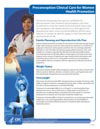Clinical Care for Women
Health Promotion
Family Planning and Reproductive Life Plan
Routine health promotion activities for all women of reproductive age should begin with screening women for their intentions to become or not become pregnant in the short and long term and their risk of conceiving (whether intended or not). Providers should encourage patients (women, men, and couples) to consider a reproductive life plan and educate patients about how their reproductive life plan affects contraceptive and medical decision-making. Every woman of reproductive age should receive information and counseling about all forms of contraception and the use of emergency contraception that are consistent with her reproductive life plan and risk of pregnancy.
Reproductive Life Plan Tool for Patients »
Reproductive Life Plan Tool for Health Professionals »
Weight Status
Reaching a healthy weight before pregnancy reduces the risks of neural tube defects, preterm delivery, diabetes, cesarean section, and hypertensive and thromboembolic disease that are associated with obesity.
Overweight
All women should have their BMI calculated at least annually. All women with a BMI ≥25 kg/m2 should be counseled about the risks to their own health and the risks to future pregnancies, including infertility.
Treatment of overweight (BMI 25 to 29.9 kg/m2) is recommended when patients have two or more risk factors or a high waist circumference. It should focus on altering dietary and physical activity patterns to prevent development of obesity and to produce moderate weight loss.
Treatment of obesity (BMI ≥30 kg/m2) should focus on producing substantial weight loss over a prolonged period. The presence of comorbidities in overweight and obese patients should be considered when deciding on treatment options.
Underweight
All women should have their BMI calculated at least annually. All women with a BMI ≤18.5 kg/m2 should be counseled about the short- and long-term risks to their own health and the risks to future pregnancies, including infertility. All women with a low BMI should be assessed for eating disorders and distortions of body image.
Physical Activity
All women should be assessed regarding muscle strength and aerobic physical activity and be offered recommendations appropriate to their physical abilities. For substantial health benefits, adults should do at least 150 minutes (2 hours and 30 minutes) a week of moderate-intensity, or 75 minutes (1 hour and 15 minutes) a week of vigorous-intensity aerobic physical activity, or an equivalent combination of moderate- and vigorous-intensity aerobic activity. Aerobic activity should be performed in episodes of at least 10 minutes, and preferably, it should be spread throughout the week.
Adults should also do muscle-strengthening activities that are moderate or high intensity and involve all major muscle groups on 2 or more days a week, as these activities provide additional health benefits.1
Nutrient Intake
All women capable of becoming pregnant should be counseled to choose foods that supply heme iron, which is more readily absorbed by the body, additional iron sources, and enhancers of iron absorption such as vitamin C-rich foods; and consume 400 micrograms (mcg) per day of synthetic folic acid (from fortified foods and/or supplements) in addition to food forms of folate from a varied diet. Women should receive a recommendation of a healthy eating pattern that limits intake of sodium, solid fats, added sugars, and refined grains and emphasizes nutrient-dense foods and beverages—vegetables, fruits, whole grains, fat-free or low-fat milk and milk products, seafood, lean meats and poultry, eggs, beans and peas, and nuts and seeds. Nutrient needs should be met primarily through consuming foods. In certain cases, fortified foods and dietary supplements may be useful in providing one or more nutrients that otherwise might be consumed in less than recommended amounts.2
Folate
Folic acid supplementation has reduced the occurrence of neural tube defects by almost half in the U.S.3
All women of reproductive age should be advised to ingest 0.4 milligrams (mg) (400 micrograms [μg]) of synthetic folic acid daily from fortified foods or supplements, or both, and to consume a balanced, healthy diet of folate-rich food.
Substance Use
Healthcare providers should identify smokers and offer them brief cessation advice at each visit; counseling and medication should be offered to patients willing to make a quit attempt. All women should be assessed at least annually for alcohol use patterns and risky drinking behaviors and be provided with appropriate counseling; all women should be advised of the risks to the embryo or fetus of alcohol exposure during pregnancy and that no safe level of alcohol consumption has been established.
Sexually Transmitted Infections (STIs)
Health care providers regularly and routinely should assess STI risks, provide counseling and other strategies (including immunizations) to prevent acquisition of STIs, and provide indicated STI testing and treatment for all women of childbearing age.
More Information
To see the complete list of the preconception clinical content and description of how the content was selected and rated, please read the full article.
References
- Physical Activity Guidelines Advisory Committee. Physical
Activity Guidelines Advisory Committee Report, 2008. Washington, DC: U.S.
Department of Health and Human Services, 2008. - U.S. Department of Agriculture and U.S. Department of Health and Human
Services. Dietary Guidelines for Americans, 2010. 7th Edition, Washington, DC: U.S. Government Printing Office, December 2010. - Centers for Disease Control. Recommendations for the use of folic acid to reduce the number of cases of spina bifida and other neural tube defects. MMWR 1992;41(No. RR-14);001.
Contact Us:
- Centers for Disease Control and Prevention
1600 Clifton Road
Atlanta, GA 30333 - 800-CDC-INFO
(800-232-4636)
TTY: (888) 232-6348
New Hours of Operation
8am-8pm ET/Monday-Friday
Closed Holidays - cdcinfo@cdc.gov



